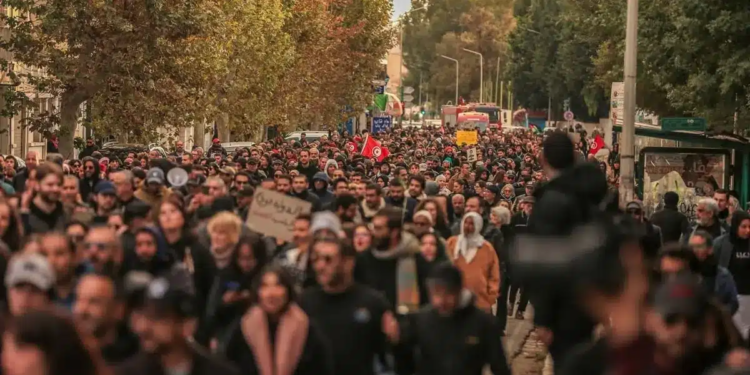A citizens’ march brought together, this Saturday, November 22, several hundred demonstrators in the streets of Tunis under the slogan “Against injustice”. The mobilization, starting from the city center, brought together activists, civil organizations and young activists denouncing the arrests deemed arbitrary and the restriction of public freedoms.
A mobilization without labels
The march formed around the Place des Droits de l’Homme before moving onto Avenue Mohamed V, then towards several symbolic arteries of the capital. Slogans rang out: “Free the detainees,” “Social justice is not a favor.”
The participants, mostly dressed in black, wanted to give the mobilization a solemn character, affirming that the color evoked the refusal of political arrests and attempts to silence dissident voices.
On the way, the procession stopped in front of the headquarters of the Tunisian Chemical Group, a passage which was not insignificant: the environmental issue in Gabès has become a transversal element in the mobilizations for rights and freedoms. The protesters demanded the shutdown of polluting units and rapid intervention to protect residents who are victims of contamination and diseases linked to industrial discharges.
In front of the National Union of Tunisian Journalists, other slogans highlighted the defense of freedom of expression, at a time when several activists, lawyers, local elected officials and journalists are being prosecuted, often on the basis of Decree-Law 54.
Converging messages for the defense of freedoms
For Saeb Souab, activist and son of the former judge and lawyer Ahmed Souab, himself imprisoned, the march is an attempt to unite around a single demand: to guarantee all Tunisians authentic political freedom, without fear of being questioned for an opinion or a publication.
He stressed that the initiative is based on a simple but fundamental idea: reject injustice, demand the release of prisoners of conscience and protect peaceful civil action, reports TAP.
For his part, Ayoub Amara, an activist engaged in social and environmental issues, described the march as a double tribute: to the victims of industrial pollution in Gabès and to those of the arrests carried out under Decree-Law 54.
He recalled that the exercise of freedoms is a constitutional right that cannot be conditioned, negotiated or intimidated, adding that “living without fear” is one of the minimum requirements of a democratic society.
A capital crossed by a message of unity
Throughout the journey, from the Belvedere to Place Pasteur, the atmosphere remained peaceful but determined. No partisan slogans were brandished, in accordance with the organizers’ wish to place this mobilization in a purely civic framework.
The plurality of participants – grassroots activists, local collectives, environmental defenders, representatives of varied political sensibilities – gave the march a transversal face, that of a protest that goes beyond traditional divisions.
Read also








